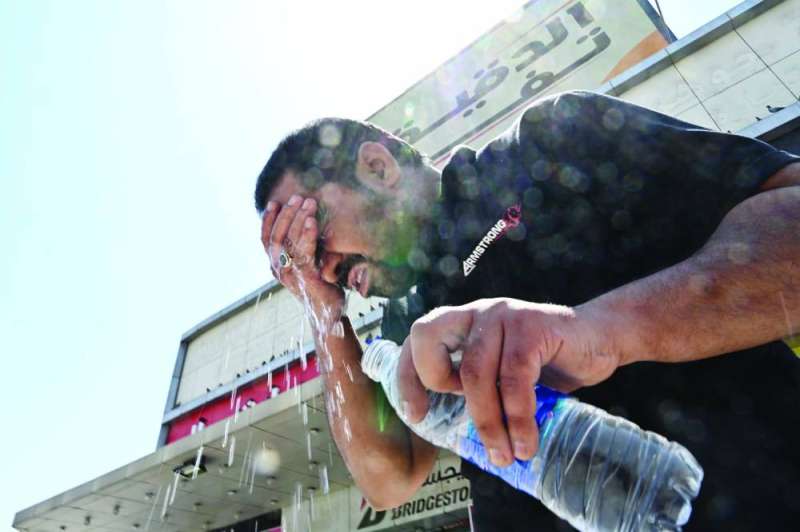
Kuwait is currently experiencing extreme temperatures, with digital clocks showing a peak of over 50°C yesterday afternoon.
Forecasts predict that the heatwave will continue today and tomorrow, potentially surpassing 52°C. July is expected to be one of the hottest months globally, according to scientists.
In response to the severe heat, specialists have issued warnings about the potential health risks, including heat exhaustion, sunstroke, and heat cramps, reports Al-Rai newspaper.
Preventive health physician Dr. Abdullah Behbehani highlighted three primary heat-related illnesses: heat cramps, heat exhaustion, and sunstroke, the latter being the most severe.
He noted that the risk of heat exhaustion and sunstroke increases with high humidity and strenuous physical activity, especially outdoors.
Heat Exhaustion
Dr. Behbehani explained that untreated heat exhaustion can escalate to sunstroke, which can be fatal.
Vulnerable groups include children, particularly infants, pregnant women, and the elderly. Children are at greater risk due to their bodies’ inability to regulate temperature effectively.

Elderly individuals may be affected by medications like diuretics, heart, and blood pressure medications, which impair the body’s ability to stay hydrated.
For pregnant women, dehydration and high temperatures can lead to severe complications such as low birth weight, preterm birth, or even stillbirth.
There can also be significant impacts on the mother, including gestational diabetes, high blood pressure during pregnancy, and premature labor.
To mitigate these risks, Dr. Behbehani advises staying informed about temperature levels and peak heat times, planning outdoor activities accordingly, and avoiding prolonged exposure during the hottest periods.
It is essential to drink water and fluids regularly, even without feeling thirsty, especially for children and pregnant women.
Additionally, having a first aid kit containing oral rehydration salts, a thermometer, water, and cloths for cooling is crucial.
Sunstroke
Dr. Ghanem Salman Al-Salem, an internal medicine consultant, warned of heat exhaustion and sunstroke due to high temperatures.
He described heat exhaustion as a condition resulting from significant fluid or salt loss due to excessive sweating, leading to symptoms like dizziness, nausea, headache, extreme thirst, circulatory collapse, high body temperature, changes in urine color, severe diarrhea or constipation, which can severely strain the heart, respiratory system, and kidneys, potentially leading to gradual organ failure.

Direct exposure to intense sunlight can also cause skin burns and cancer.
Dr. Al-Salem emphasized the severe risks of sunstroke, advising that it requires careful management as it can be deadly.
Symptoms include headache, blurred vision, confusion, loss of time awareness, muscle and nerve convulsions, and unconsciousness.
Tips to avoid heat-related illnesses
Dr. Al-Salem provided medical advice to avoid heat-related illnesses:
- Avoid going out and engaging in strenuous activity during peak heat times.
- Stay in the shade and away from direct sunlight.
- Spend 2-3 hours in a cool place during the day.
- Monitor weather warnings regarding heatwaves.
- Keep the home cool and turn off as many electrical appliances as possible.
- Avoid using electric fans if the temperature is above 40°C, as they can heat the body.
- Limit outdoor activities during hot and humid weather.
- Drink plenty of fluids to replace those lost through sweating.
- Avoid tea, coffee, and soft drinks as they can lead to further fluid loss.
- Wear lightweight, light-colored clothing.
- Use sunscreen and wear a hat or umbrella.
- Keep track of the weather to plan outdoor activities.
- Have a first aid kit with oral rehydration solutions, a thermometer, water bottles, cooling cloths, and a portable hand fan or water spray.
- Know how to get help and have contact information for the nearest healthcare center or ambulance service.
- Set the air conditioner to 27°C and use an electric fan to make the room feel cooler.
Impact on health
Dr. Abeer Al-Bahouh, Director of the Health Promotion Department, emphasized that climate and weather have significant direct and indirect effects on human life.

Despite the human body’s ability to adapt to environmental conditions, there are limits. Extreme short-term weather changes can have severe health impacts, such as heat exhaustion.
Dr. Al-Bahouh noted that heatwaves severely affect large populations worldwide, with an increasing number of people exposed to extreme heat due to climate change in all regions.
She highlighted that global heat-related deaths among those over 65 have increased by about 85% from 2000-2004 to 2017-2021.
Studies show that from 2000 to 2019, approximately 489,000 people died annually due to heat, with 45% in Asia and 36% in Europe.
In the summer of 2022 alone, Europe experienced around 61,672 additional heat-related deaths.
She pointed out that heat is a significant environmental and occupational hazard. Heat stress is a leading cause of weather-related deaths globally and can exacerbate underlying health conditions, including cardiovascular diseases, diabetes, mental health issues, and asthma.
It also increases the risk of accidents and the transmission of certain infectious diseases.
Clothing recommendations
Dr. Behbehani stressed the importance of using sunscreen and wearing a hat or umbrella, avoiding unnecessary clothing, especially for children, choosing light-colored cotton clothing to reduce rash and absorb sweat, and ensuring clothing is loose-fitting.
Know how to handle heat exhaustion
Dr. Behbehani advised recognizing the symptoms of heat exhaustion and acting quickly by moving the affected person to a cool, air-conditioned place.
He recommends to apply wet cloths to the body, especially the head, neck, armpits, and thighs.
It is advised to remove unnecessary outer clothing, especially for children and infants, to cool the body before transferring to a healthcare facility.
Some cases may require giving the patient oral rehydration solutions before transporting them to a health center.
Risk to the brain
Dr. Ghanem Al-Salem explained that if the brain’s temperature exceeds 40°C for more than five minutes, it can suffer permanent damage if body temperature is not controlled within 30 to 40 minutes, potentially leading to death or loss of bodily functions, requiring hospital treatment.
Symptoms requiring hospitalization
Dr. Abeer Al-Bahouh stated that severe symptoms due to extreme heatwaves necessitate immediate hospital transport. These include:
- Confusion, lack of clear responsiveness, seizures, coma, or unresponsiveness.
- Extremely high body temperature for over two hours, reaching 40°C.
- Not urinating for over eight hours or dark urine.
- Rapid heartbeat and breathing.












